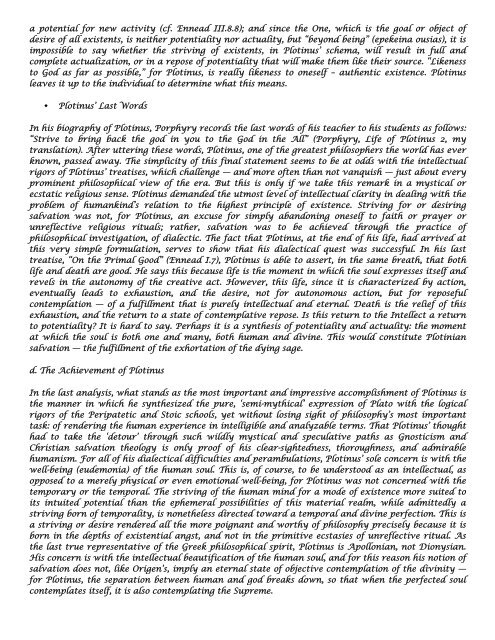Neo-Platonism - Grand Lodge Bet-El
Neo-Platonism - Grand Lodge Bet-El
Neo-Platonism - Grand Lodge Bet-El
You also want an ePaper? Increase the reach of your titles
YUMPU automatically turns print PDFs into web optimized ePapers that Google loves.
a potential for new activity (cf. Ennead III.8.8); and since the One, which is the goal or object of<br />
desire of all existents, is neither potentiality nor actuality, but “beyond being” (epekeina ousias), it is<br />
impossible to say whether the striving of existents, in Plotinus’ schema, will result in full and<br />
complete actualization, or in a repose of potentiality that will make them like their source. “Likeness<br />
to God as far as possible,” for Plotinus, is really likeness to oneself – authentic existence. Plotinus<br />
leaves it up to the individual to determine what this means.<br />
• Plotinus’ Last Words<br />
In his biography of Plotinus, Porphyry records the last words of his teacher to his students as follows:<br />
“Strive to bring back the god in you to the God in the All” (Porphyry, Life of Plotinus 2, my<br />
translation). After uttering these words, Plotinus, one of the greatest philosophers the world has ever<br />
known, passed away. The simplicity of this final statement seems to be at odds with the intellectual<br />
rigors of Plotinus’ treatises, which challenge — and more often than not vanquish — just about every<br />
prominent philosophical view of the era. But this is only if we take this remark in a mystical or<br />
ecstatic religious sense. Plotinus demanded the utmost level of intellectual clarity in dealing with the<br />
problem of humankind’s relation to the highest principle of existence. Striving for or desiring<br />
salvation was not, for Plotinus, an excuse for simply abandoning oneself to faith or prayer or<br />
unreflective religious rituals; rather, salvation was to be achieved through the practice of<br />
philosophical investigation, of dialectic. The fact that Plotinus, at the end of his life, had arrived at<br />
this very simple formulation, serves to show that his dialectical quest was successful. In his last<br />
treatise, “On the Primal Good” (Ennead I.7), Plotinus is able to assert, in the same breath, that both<br />
life and death are good. He says this because life is the moment in which the soul expresses itself and<br />
revels in the autonomy of the creative act. However, this life, since it is characterized by action,<br />
eventually leads to exhaustion, and the desire, not for autonomous action, but for reposeful<br />
contemplation — of a fulfillment that is purely intellectual and eternal. Death is the relief of this<br />
exhaustion, and the return to a state of contemplative repose. Is this return to the Intellect a return<br />
to potentiality? It is hard to say. Perhaps it is a synthesis of potentiality and actuality: the moment<br />
at which the soul is both one and many, both human and divine. This would constitute Plotinian<br />
salvation — the fulfillment of the exhortation of the dying sage.<br />
d. The Achievement of Plotinus<br />
In the last analysis, what stands as the most important and impressive accomplishment of Plotinus is<br />
the manner in which he synthesized the pure, ‘semi-mythical’ expression of Plato with the logical<br />
rigors of the Peripatetic and Stoic schools, yet without losing sight of philosophy’s most important<br />
task: of rendering the human experience in intelligible and analyzable terms. That Plotinus’ thought<br />
had to take the ‘detour’ through such wildly mystical and speculative paths as Gnosticism and<br />
Christian salvation theology is only proof of his clear-sightedness, thoroughness, and admirable<br />
humanism. For all of his dialectical difficulties and perambulations, Plotinus’ sole concern is with the<br />
well-being (eudemonia) of the human soul. This is, of course, to be understood as an intellectual, as<br />
opposed to a merely physical or even emotional well-being, for Plotinus was not concerned with the<br />
temporary or the temporal. The striving of the human mind for a mode of existence more suited to<br />
its intuited potential than the ephemeral possibilities of this material realm, while admittedly a<br />
striving born of temporality, is nonetheless directed toward a temporal and divine perfection. This is<br />
a striving or desire rendered all the more poignant and worthy of philosophy precisely because it is<br />
born in the depths of existential angst, and not in the primitive ecstasies of unreflective ritual. As<br />
the last true representative of the Greek philosophical spirit, Plotinus is Apollonian, not Dionysian.<br />
His concern is with the intellectual beautification of the human soul, and for this reason his notion of<br />
salvation does not, like Origen’s, imply an eternal state of objective contemplation of the divinity —<br />
for Plotinus, the separation between human and god breaks down, so that when the perfected soul<br />
contemplates itself, it is also contemplating the Supreme.
















